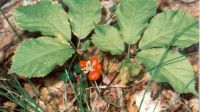4 ways to profit Mother Nature:
ASKING? - INCENTIVES - REPLANTING - EDUCATION
Asking is the best way to gain the cooperation of
wild plants!
If we wish to grow ginseng, we can ask: how does this plant
normally prefer to grow in nature?
By giving the plant what it prefers, it will grow better!
We can ask the plant to tell us what it needs.
We can ask the plant to grow well for us.
If we want medicine we can ask: what is the natural power
of this plant? What is the best way to prepare it and use it?
We can ask the plant to be good for our health.
Storing, drying, preparing, shipping, and merchandising herbs:
what does this plant (or part of a plant) need to maintain
its vital powers, in order to ultimately benefit the
person who uses it?
Asking the plants makes them feel respected.
Treating them as partners, the plants can help us more!
WOODLAND OWNER INCENTIVES
Wild Ginseng and Goldenseal are both valuable
resources from woodlands. Next year or the year after
it might be any one of the hundreds of plants who live
in our forests, that gains popularity as useful medicine!
Our children may need that medicine!
Most woods are privately owned. Farmers and landowners
are pressed to get income from their land in order to
support taxes and maintenance expenses. Often the woods
are logged severely or converted to cattle pastures,
for the income.
In 1996, in Adair County Kentucky I paid a percent of
digging income to 7 landowners, from whose woods the
herbs were extracted. I am continuing that relationship
with one landowner at present.
An article in the local paper also encouraged landowners
to think about leasing the digging rights.
Sharing wild herbs profit with the owners of woodland,
provides incentive for the landowner to sustain the woodlands
where herbs grow wild.
Re-planting native herbs that have disappeared
or become scarce from a woods, is a very good way to
ensure their survival in the future!
It's easy! Simply look at what kind of conditions
that plant chooses in its natural habitat. Then find
a source of seed or rootstocks, and plant them
in appropriate conditions in the woods.
Re-planting is one of the main ways to show respect
and partnership with the herbs. In return, the herbs
will help you in any way they can!
Cultivated production of native herbs, such as ginseng,
is a way of supplying our human needs without destroying
the natural wild resource. Cultivation is a protection
for the wild.
When cultivating, you can learn from the wild habitat
how to give the plants what they prefer.
The iherb plants have evolved specifically
to serve humans and other animals as medicines.
They have evolved to grow mixed in with other herbs
of forest and meadow habitats. They have evolved
to grow wild and freely accessible for all who need them.
Both wild and cultivated planting are of great benefit!
We need both!
Another excellent way to give nature a helping hand
is to encourage other people! Support schools and nonprofits
education about nature and wildlife -- and take action on your
own! We need more specific and complete introduction of people
to the beauty and value of wild herb plants.
The many plants of forest and meadow, as well as the animals,
are partners with humans on earth! Since many people don't
get
a chance to spend time in nature, we need to bring images and
information to them, so they will know something about their
wild neighbours and appreciate their inter-dependence with wild
partners.
Here are some ways you can help Mother Nature!
- Herb walks are a fun way to learn and teach!
- Talk or write about how to use plants
- Be a voice in favour of wild habitats
- Express nature interest through the arts!
Please write and tell me about your activity
to help wild plants and habitats.
